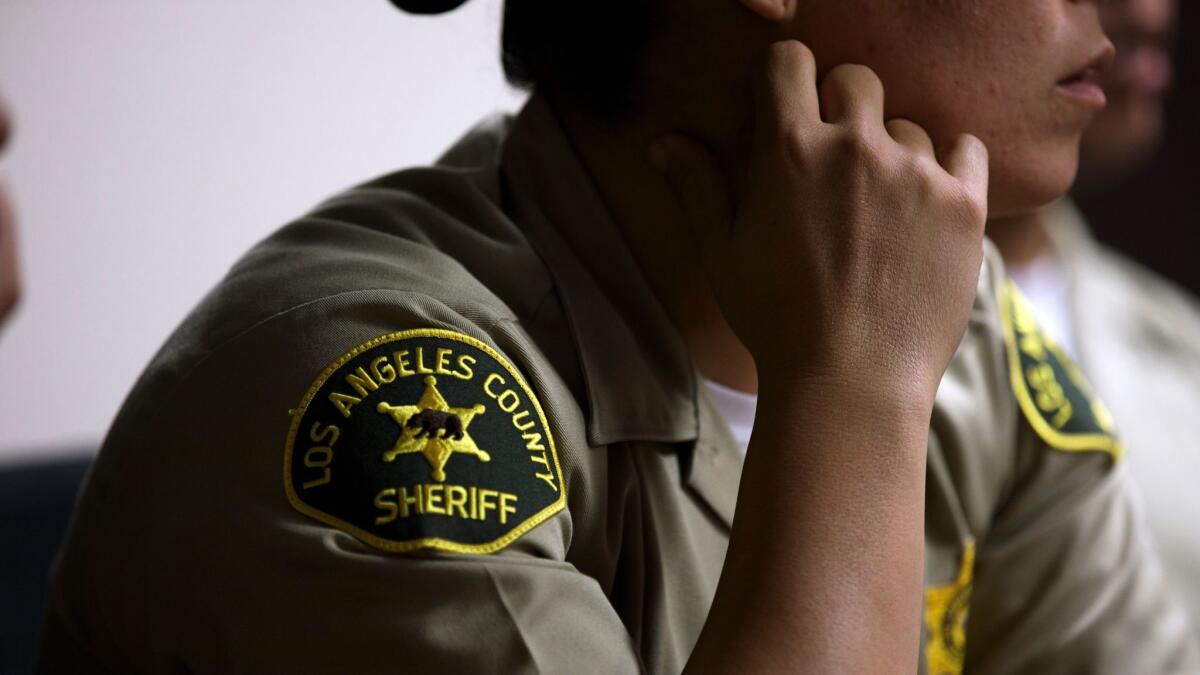Editorial: Police union clout is interfering with California’s efforts to deal with problem officers

- Share via
It’s troubling enough that the members of the public in California have no access to the discipline and misconduct files of their police and therefore can’t know the caliber of officers serving them, or whether a particular handful are unreliable or dangerous on the street or are costing too much in liability settlements.
What’s worse — shockingly so — is that in some jurisdictions (including Los Angeles County) even prosecutors have no such access, even though that information is absolutely essential if defendants are to have fair trials.
It’s not getting better. Despite nationwide clamoring for increased police transparency and accountability, court interpretations of California law have put police records more thoroughly out of reach here than in any other state. When Los Angeles County Sheriff Jim McDonnell tried to send Dist. Atty. Jackie Lacey a list of 300 of his deputies who have problematic conduct records, he was sued by the Assn. of Los Angeles Deputy Sheriffs — the labor union for rank-and-file deputies. In July, the 2nd District Court of Appeal sided with the union.
Prosecutors must be able to know who they are putting on the witness stand, and whether they have histories of dishonesty or other misconduct.
The ruling now calls into question the practices of agencies in other California counties, including San Francisco, San Luis Obispo and Sacramento, that routinely share the names of problem officers with prosecutors.
The state Supreme Court will hear the case next year and can — and should — overturn the lower court. Prosecutors must be able to know who they are putting on the witness stand, and whether they have histories of dishonesty or other misconduct that call their credibility into question.
More to the point, prosecutors have a constitutional duty under the landmark 1963 case Brady vs. Maryland to inform defendants of information that calls the reliability of prosecution witnesses into question. If they don’t have that information themselves, it is exceedingly difficult to fulfill that duty.
Who are L.A. County’s problem deputies, and how did they earn their place on the sheriff’s secret “Brady” list? There was no way of knowing — until now. Times reporters Maya Lau, Ben Poston and Corina Knoll learned the names and went to work uncovering the misdeeds. Thanks to the reporters’ efforts, we now know that several deputies still serving have been convicted of crimes. Others were reprimanded but escaped prosecution. One faked a search warrant rather than seek one from a judge. One wrote a false report after pepper-spraying an elderly man in the face. One agreed to leave a sergeant out of an arrest report. Others have records of family violence or sexual misconduct with members of the public.
The Times story necessarily raises the question of how it is that deputies with records of lying, falsifying reports and other misconduct could still be serving. The answer lies in part in a civil service process that can overturn the sheriff’s decision to fire or discipline a deputy, and thus undermine his authority. The Board of Supervisors ordered changes to the process to ensure that the sheriff’s side of the case is adequately presented to the Civil Service Commission, but county employee unions are pushing back.
The power of law enforcement unions lies at the core of California laws and procedures that protect officers, keeping information about their conduct secret from the public and even from prosecutors, no matter how egregious their actions.
Law enforcement is a difficult and dangerous job, and should not be made more difficult and dangerous by unwarranted release of personnel records. But unlike teachers, firefighters or most other public employees, peace officers are empowered by the public to deny people their liberty and, in some cases, their lives, in the name of public safety. They must sacrifice some measure of privacy to ensure that their misconduct is sufficiently discoverable to enable the accused to defend themselves in court, and the public to monitor their actions and curb their conduct when necessary.
Courts that have protected officers from disclosure of their misdeeds have done so to uphold laws adopted by a Legislature that has been too willing to accept law enforcement union contributions and carry water for those unions. Regardless of how the state Supreme Court rules when McDonnell’s Brady case comes before it next year, it is well past time for lawmakers to show a little independence from law enforcement unions. It is time to let members of the public know a little more about the officers who serve them.
Follow the Opinion section on Twitter @latimesopinion and Facebook
More to Read
A cure for the common opinion
Get thought-provoking perspectives with our weekly newsletter.
You may occasionally receive promotional content from the Los Angeles Times.









